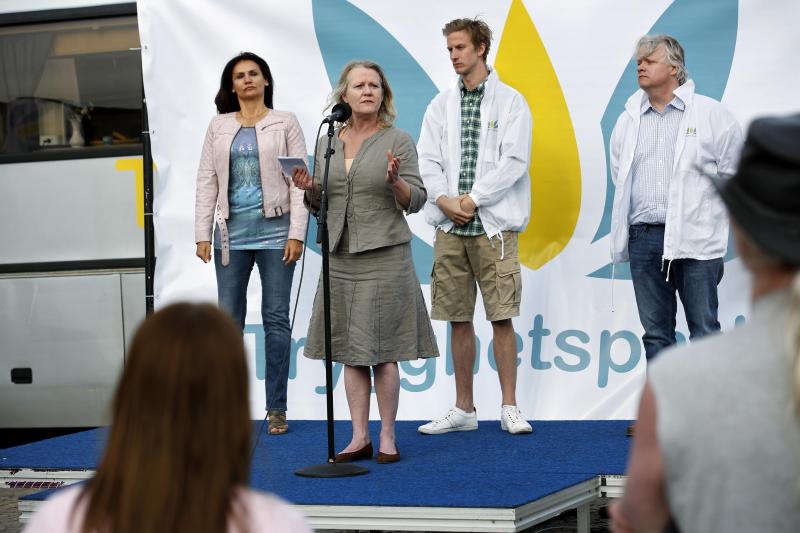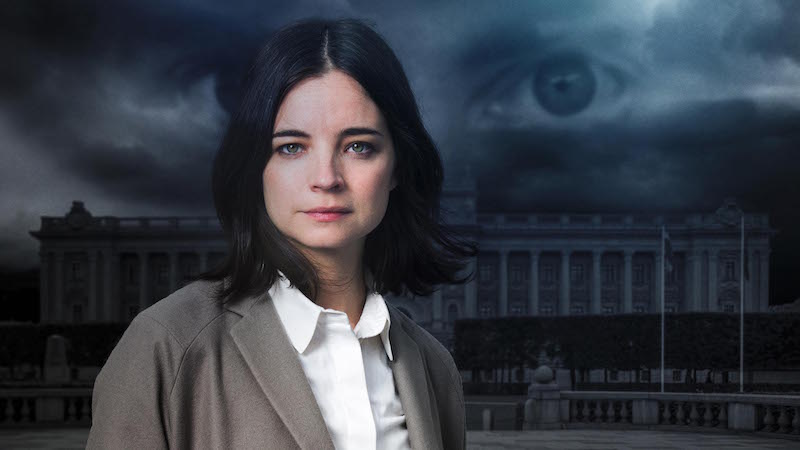Blue Eyes, More4 | reviews, news & interviews
Blue Eyes, More4
Blue Eyes, More4
Taut and topical, Blue Eyes is more substantial than the typical Scandi noir

Blue Eyes, the latest imported Swedish drama, has a lot of hype to live up to. After Borgen, Wallander, The Killing and the rest, Scandi noir is scarcely a novelty in itself. Yet Blue Eyes brings the ultra-topical subject of the far right and the immigration debate to the more familiar territory of murders in sun-starved pinescapes.
On the evidence of last night’s show, both concept and execution are taut and finely structured, with domestic and political plausibly woven together. There has already been one mysterious disappearance in a dank wood, so fans of traditional Scandi noir won’t be disappointed. But it’s connected to mysterious political manoeuvring, and it’s in the tense space where individual character, party politics and seething social resentments coalesce that Blue Eyes seems destined to shine.
 The most original creation so far has been Annika Nilsson (Anna Bjelkerud), grandmother, careworker and local representative of the far-right Trygghetspartiet, or Security Party. It’s not so much that any one of her characteristics is unusual, but that the subtlety and even-handedness with which her genuine concerns about working-class Swedes are set against a much more cynical party machinery, while her family wrestles with the consequences of her stance in a society that still likes to think itself tolerant. It was a shame she was murdered so early on, although but her daughter Sofia – already dealing with an abusive partner – takes her central role forward with interest.
The most original creation so far has been Annika Nilsson (Anna Bjelkerud), grandmother, careworker and local representative of the far-right Trygghetspartiet, or Security Party. It’s not so much that any one of her characteristics is unusual, but that the subtlety and even-handedness with which her genuine concerns about working-class Swedes are set against a much more cynical party machinery, while her family wrestles with the consequences of her stance in a society that still likes to think itself tolerant. It was a shame she was murdered so early on, although but her daughter Sofia – already dealing with an abusive partner – takes her central role forward with interest.
In the mainstream political world, meanwhile, events so far are rather more conventional, and it’s too early to say whether the scheming and subterfuge develops into anything more original. However, the role of Elin Hammar (Louise Peterhoff, pictured above), an apparently naive young waitress drafted into the Minister of Justice’s office to take the place – without asking any awkward questions – of the woman lost in the wood bodes well for the future. Of course, the first thing she does is poke her nose into the mystery, and it stinks. So far, the far-right politicians seem more decent than those in the centrist coalition government.
The show’s writer, Alex Haridi, began work on this script long before Sweden’s real right-wingers had achieved significant success, and has thus been lauded for his prescience. The more excitable previews have been even mentioned the W-word: The Wire, that vast and rightly celebrated televisual portrait of Baltimore’s threadbare, drug-addled and obscenely violent social fabric. That series’ bloodshed is surely on a scale not seen in Western Europe since 1945, and Blue Eyes won’t have the time for The Wire’s epic horizons. Its virtues are quieter and less showy, though not necessarily less skilful. It’s more like a hybrid of Happy Valley and House of Cards, blending the authentic social range of the one with the scheming political devilment of the other. It probably has more to say about the social contract than either, and that’s more than you’ll find on any other channel on a Friday night.
The future of Arts Journalism
You can stop theartsdesk.com closing!
We urgently need financing to survive. Our fundraising drive has thus far raised £49,000 but we need to reach £100,000 or we will be forced to close. Please contribute here: https://gofund.me/c3f6033d
And if you can forward this information to anyone who might assist, we’d be grateful.

Subscribe to theartsdesk.com
Thank you for continuing to read our work on theartsdesk.com. For unlimited access to every article in its entirety, including our archive of more than 15,000 pieces, we're asking for £5 per month or £40 per year. We feel it's a very good deal, and hope you do too.
To take a subscription now simply click here.
And if you're looking for that extra gift for a friend or family member, why not treat them to a theartsdesk.com gift subscription?
more TV
 theartsdesk Q&A: director Stefano Sollima on the relevance of true crime story 'The Monster of Florence'
The director of hit TV series 'Gomorrah' examines another dark dimension of Italian culture
theartsdesk Q&A: director Stefano Sollima on the relevance of true crime story 'The Monster of Florence'
The director of hit TV series 'Gomorrah' examines another dark dimension of Italian culture
 The Monster of Florence, Netflix review - dramatisation of notorious Italian serial killer mystery
Director Stefano Sollima's four-parter makes gruelling viewing
The Monster of Florence, Netflix review - dramatisation of notorious Italian serial killer mystery
Director Stefano Sollima's four-parter makes gruelling viewing
 The Diplomat, Season 3, Netflix review - Ambassador Kate Wyler becomes America's Second Lady
Soapy transatlantic political drama keeps the Special Relationship alive
The Diplomat, Season 3, Netflix review - Ambassador Kate Wyler becomes America's Second Lady
Soapy transatlantic political drama keeps the Special Relationship alive
 The Perfect Neighbor, Netflix review - Florida found-footage documentary is a harrowing watch
Sundance winner chronicles a death that should have been prevented
The Perfect Neighbor, Netflix review - Florida found-footage documentary is a harrowing watch
Sundance winner chronicles a death that should have been prevented
 Murder Before Evensong, Acorn TV review - death comes to the picturesque village of Champton
The Rev Richard Coles's sleuthing cleric hits the screen
Murder Before Evensong, Acorn TV review - death comes to the picturesque village of Champton
The Rev Richard Coles's sleuthing cleric hits the screen
 Black Rabbit, Netflix review - grime and punishment in New York City
Jude Law and Jason Bateman tread the thin line between love and hate
Black Rabbit, Netflix review - grime and punishment in New York City
Jude Law and Jason Bateman tread the thin line between love and hate
 The Hack, ITV review - plodding anatomy of twin UK scandals
Jack Thorne's skill can't disguise the bagginess of his double-headed material
The Hack, ITV review - plodding anatomy of twin UK scandals
Jack Thorne's skill can't disguise the bagginess of his double-headed material
 Slow Horses, Series 5, Apple TV+ review - terror, trauma and impeccable comic timing
Jackson Lamb's band of MI5 misfits continues to fascinate and amuse
Slow Horses, Series 5, Apple TV+ review - terror, trauma and impeccable comic timing
Jackson Lamb's band of MI5 misfits continues to fascinate and amuse
 Coldwater, ITV1 review - horror and black comedy in the Highlands
Superb cast lights up David Ireland's cunning thriller
Coldwater, ITV1 review - horror and black comedy in the Highlands
Superb cast lights up David Ireland's cunning thriller
 Blu-ray: The Sweeney - Series One
Influential and entertaining 1970s police drama, handsomely restored
Blu-ray: The Sweeney - Series One
Influential and entertaining 1970s police drama, handsomely restored
 I Fought the Law, ITVX review - how an 800-year-old law was challenged and changed
Sheridan Smith's raw performance dominates ITV's new docudrama about injustice
I Fought the Law, ITVX review - how an 800-year-old law was challenged and changed
Sheridan Smith's raw performance dominates ITV's new docudrama about injustice
 The Paper, Sky Max review - a spinoff of the US Office worth waiting 20 years for
Perfectly judged recycling of the original's key elements, with a star turn at its heart
The Paper, Sky Max review - a spinoff of the US Office worth waiting 20 years for
Perfectly judged recycling of the original's key elements, with a star turn at its heart

Add comment